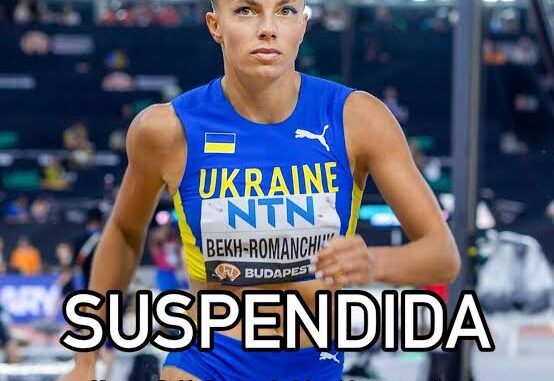
Ukrainian Olympic medalist Maryna Bekh-Romanchuk has been provisionally suspended for suspected use of the banned drug testosterone….
Ukrainian long jumper and sprinter Maryna Bekh-Romanchuk has been provisionally suspended from competition following a suspected anti-doping violation involving the use of testosterone, a substance banned by the World Anti-Doping Agency (WADA). The suspension comes as a significant blow to Ukraine’s athletics program and raises serious concerns ahead of the 2024 Paris Olympics.
Bekh-Romanchuk, a silver medalist at the 2019 World Championships in Doha and a consistent European contender, has long been regarded as one of Ukraine’s top track and field athletes. Her suspension was announced by the Athletics Integrity Unit (AIU), the independent body responsible for anti-doping matters in international athletics. The AIU confirmed that Bekh-Romanchuk had tested positive for an exogenous form of testosterone during an out-of-competition test conducted earlier this year.
Under WADA regulations, testosterone is classified as an anabolic androgenic steroid and is strictly prohibited both in-competition and out-of-competition. The use of such substances can lead to enhanced performance by increasing muscle mass, strength, and recovery. Athletes found guilty of intentional doping face suspensions of up to four years for a first offense.
While the AIU emphasized that the suspension is provisional and not a final determination of guilt, the implications are already significant. Bekh-Romanchuk is barred from all competitions pending the outcome of her case, which may include a disciplinary hearing if she chooses to contest the results or present mitigating factors.
In a brief statement released through her management, Bekh-Romanchuk denied knowingly using any banned substances. She said she is fully cooperating with the investigation and is working with her legal team to understand the source of the alleged violation. “I am shocked and devastated by the news,” her statement read. “I have always competed clean and will do everything in my power to clear my name.”
The Ukrainian Athletics Federation expressed its disappointment at the situation but stopped short of commenting on the details of the case, citing the ongoing investigation. The Federation pledged to support Bekh-Romanchuk’s right to due process while reaffirming its commitment to clean sport.
Bekh-Romanchuk’s suspension also has broader implications for Ukraine’s Olympic prospects. With the Paris Games fast approaching, her absence would leave a noticeable gap in the Ukrainian track and field squad. She had been expected to compete in both the long jump and the 400m hurdles—events in which she had shown considerable progress in recent seasons.
The case adds to a growing list of doping suspensions in international athletics, underscoring the continuing challenges facing anti-doping bodies. While advancements in testing technology have made it easier to detect violations, cases like this highlight the complexity and potential fallout of such investigations—not just for athletes, but for their countries and the integrity of sport as a whole.
As the investigation continues, all eyes will be on the AIU and WADA to ensure that the process is transparent, fair, and thorough. For now, Bekh-Romanchuk’s athletic future hangs in the balance.



Be the first to comment